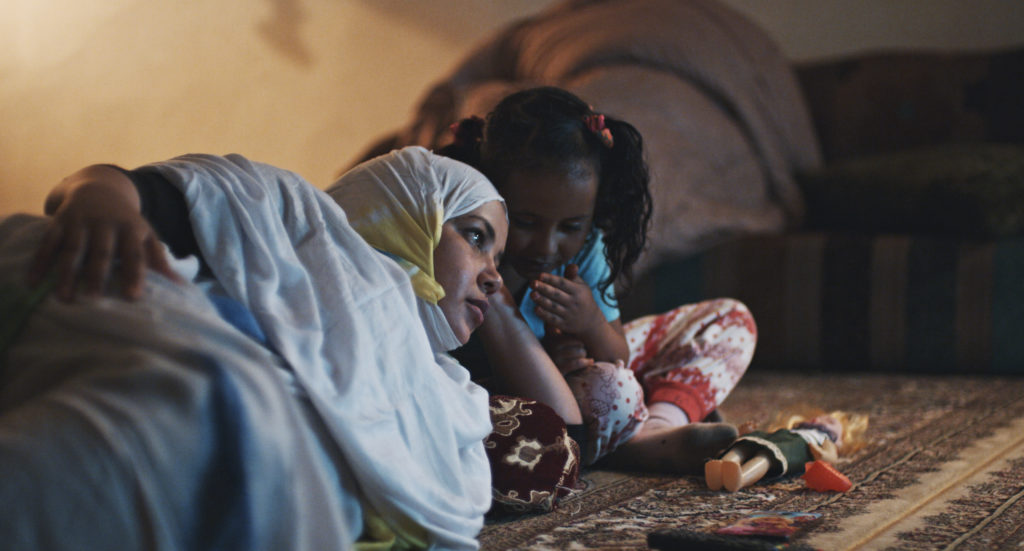
‘Flesh Out’ Exposes the Complexity and Multiplicity of Female Beauty Standards
Written by: Lauren Humphries-Brooks, CC2K Staff Writer
We often remark that standards of female beauty are culturally specific: what is considered “beautiful” and “ugly” shifts from culture to culture, from historical era to historical era. But we often don’t consider that different narratives often exist side-by-side in different cultures and subgroups, creating an odd and at times contradictory concept of what women should aspire to be. Flesh Out, from Italian director Michela Occhipinti, deals with these contradictions and attempts to cast some light on the toll that beauty standards can take on the female body and soul.
Flesh Out features Verida Beitta Ahmed Deiche in the role of Verida, a young woman in Mauritania nearing an arranged marriage. Verida must undergo the process of “gavage,” a ritualized act of overeating, in order to gain weight and fulfill a traditional beauty standard of being large and voluptuous. Verida begins the ritual quietly but somewhat reluctantly, exhausted by her mother’s demands that she awaken early in the morning for her first meal (one of ten throughout the day), and consume massive amounts of milk, fats, and meat in an effort to the gain the “correct” amount of weight to make herself more desirable to her future husband. Verida is beset on all sides: by her friends, several of whom find gavage backwards but long for the standard of thinness promoted by popular culture; her mother and grandmother, who appraise and criticize her body; and her own desires about her body and her future. As the film proceeds, Verida seeks a way to maintain her own sense of self in the face of the pressure of her family and the often contradictory culture that surrounds her.
Flesh Out’s strength lies in its interrogation of the role of women in policing the bodies and minds of other women. The film focuses on the female characters, even to the point that the men are hardly ever seen. Verida’s father, her future husband, and even her nascent love interest Sidi are minor characters, often seen out of focus or in such tight close-up that their features can be hard to distinguish and their presences, while formative in terms of the culture, are largely unimportant. What is important are the complexity and multiplicity of the female relationships, from Verida’s debates with both her mother and grandmother as she pushes back against the increasing abuse of her body, to her more “modern” friends, who have diverse perspectives on how she should deal with the ritual of overeating. There are scenes of great joy and even celebration of female beauty standards as well, a reminder that women often socially bond under the guise of reinforcing their physical attractions. Verida is training to take over her grandmother’s beauty salon, where she learns to mix and paint henna for weddings. She attends a “wengala” (where women undergoing gavage get together to eat, dance, and talk) with her friends and there finally begins to enjoy herself in the midst of female company. It is within the tension between tradition and modernity that the film finds its firmest footing, as Verida undergoes a traditional ritual against the background of a world replete with cell phones, the internet, and modern beauty standards of thinness. This tension makes for fascinating images and conversations that edge into cinema verite style.
Some of the quality of Flesh Out becomes obscured in odd choices about camera angles and framing—one scene, meant to depict Verida spying on her new husband (whom she hasn’t actually met), is filmed through a window with a swaying camera, so that the perspective ends up overlaying what’s happening on screen. And the film does this too often, opting for close-ups of faces, dwelling on images, and moving the camera slowly in scenes with little to no dialogue, which becomes frustrating for the viewer. This may be one of those films better seen on a small screen, for the camera eye often takes up positions far too close to the characters for comfort.
Flesh Out is strongest when it delves into the complexity of female relationships, weakest when it attempts to provide more narrative arc to a satisfying conclusion. It wants to be a character study, with no clear ending and beginning, and its attempts to create a comprehensive through-narrative fall somewhat flat. But it’s a well-made, well-acted film, drawing into question the concept of beauty standards and the need for women to break out of culturally sanctioned and enforced roles, whatever they may be.
Flesh Out is now showing at the Tribeca Film Festival.
